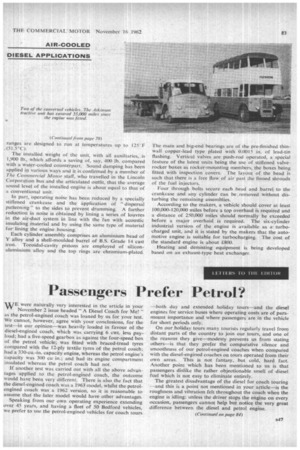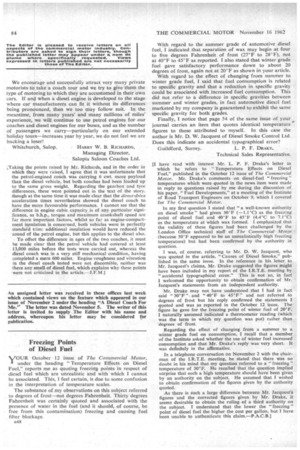Passengers Prefer Petrol?
Page 85

Page 86

If you've noticed an error in this article please click here to report it so we can fix it.
WE were naturally very interested in the article in your November 2 issue headed " A Diesel Coach for Me! " as the petrol-engined coach was loaned by us for your test. We cannot, however, agree with your conclusions, for the lest—in our opinion—was heavily loaded in favour of the diesel-engined coach, which was carrying 6 cwt. less payload; had a five-speed gearbox as against the four-speed box of the petrol vehicle; was fitted with braced-tread tyres compared with the 12-ply textile tyres of the petrol coach; had a 330-cu.-in. capacity engine, whereas the petrol engine's capacity was 300 cu in.; and had its engine compartment insulated whereas the petrol coach had not.
If another test was carried out with all the above advantages applied to the petrol-engined coach, the outcome would have been very different. There is also the fact that the diesel-engined coach was a 1963 model, whilst the petrolcngined coach was a 1962 version. so it is reasonable to assume that the later model would have other advantages.
Speaking from our own operating experience extending over 45 years, and having a fleet of 50 Bedford vehicles, we prefer to use the petrol-engined vehicles for coach tours
—both day and extended holiday tours--and the diesel engines for service buses where operating costs are of paramount importance and where passengers are in the vehicle for short periods only.
On our holiday tours many tourists regularly travel from distant parts of the country to join our tours, and one of the reasons they give—modesty prevents us from stating others—is that they prefer the comparative silence and smoothness of our petrol-engined coaches when compared with the diesel-engined coaches on tours operated from their own areas. This is not fantasy, but cold, hard fact. Another point which has been mentioned to us is that passengers dislike the rather objectionable smell of diesel fuel which is not easy to eliminate entirely.
The greatest disadvantage of the diesel for coach touring —and this is a point not mentioned in your article—is the roughness and vibration felt throughout the coach when the engine is idling: unless the driver stops the engine on every occasion, passengers cannot help but notice the very great difference between the diesel and petrol engine.
We encourage and successfully attract very many private motorists to take a coach tour and we try to give them the type of motoring to which they are accustomed in their own cars. If and when a diesel engine is developed to the stage where car manufacturers can fit it without its differences being pronounced, then we too may follow suit. In the meantime, from many years' and many millions of miles' experience, we will continue to use petrol engines for our coaches and diesel engines for our buses, and as the number of passengers we carry—particularly on our extended holiday tours—increases year by year, we do not feel we are backing a loser!
Whitchurch, Salop. • HARRY W. B. RICHARDS, Managing Director, Salopia Saloon Coaches Ltd.
;Taking the points raised by Mr. Richards, and in the order in which they were raised, I agree that it was unfortunate that the petrol-engined coach was carrying 6 cwt. more payload than the diesel vehicle, but both coaches had been loaded up to the same gross weight, Regarding the gearbox and tyre differences, these were pointed out in the text of the story. though at the same time it was made clear that the direct-drive acceleration times nevertheless showed the diesel coach to have the more favourable performance. I cannot see that the difference in engine cubic capacity is of any particular significance, as b.h.p., torque and maximum crankshaft speed arc far more important factors, whilst so far as engine-compartment insulation is concerned, both vehicles were in perfectly standaid trim: additional insulation would have reduced the sound of the petrol engine, but this applies to the diesel also.
To offset the difference in ages of the two coaches, it must be made clear that the petrol vehicle had covered at least 13,000 miles before the tests were carried out, whereas the diesel coach was in a very stiff mechanical condition, having completed a mere 600 miles. Engine'roughness and vibration in the diesel coach tested were not discernible, neither was there any smell of diesel fuel, which explains why these points were not criticized in the article.—J.F.M1








































































































































